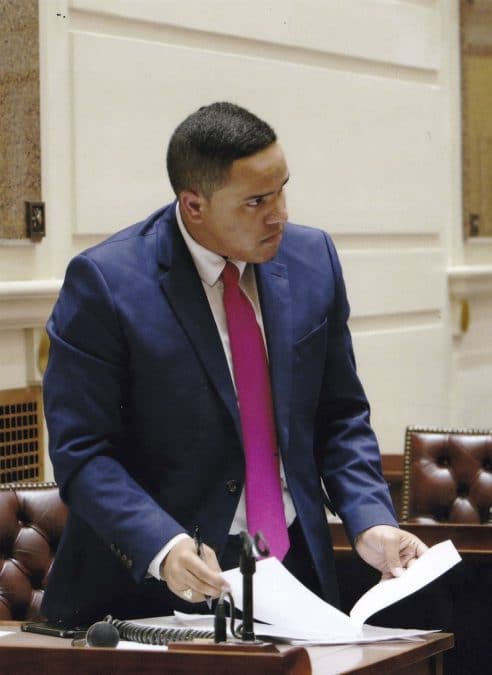In March 2019, Citizen Potawatomi Nation tribal member Trae Trousdale became the first Native American to hold the position of Oklahoma City University Student Government Association president in the school’s history.
“It was a great honor to find out that I had won,” he said. “I was sitting in the parking lot of my fraternity house, heading into an executive meeting. Sitting there, watching the sunset from my car by myself when I found that out is one of the greatest memories I have.”

Aside from breaking barriers of diversity, the Toupin family descendant spent the first half of his term in the 2019-20 academic year restructuring the entire organization — from the constitution to beginning long-term projects that reset the university’s standards of serving students.
From the ground up
As a member of SGA since his freshman year, Trousdale watched two previous administrations and how they led the organization prior to running. As president, he decided to redefine, rebrand and revitalize the association.
“I noticed that SGA was beginning to lose a sense of purpose and trust from the student body,” Trousdale explained. “And that was something I wanted to assist in bolstering throughout the coming year.”
He attempted to reinstate that trust and authority by spearheading a complete rewrite of the OCU SGA constitution, bylaws, standing rules and election rules. They cut executive overreach by rethinking the vice president’s dual role as the president of the student senate and member of the executive cabinet. The new governing documents also shifted elections to a ticket system and created new executive cabinet positions with clearly outlined responsibilities.
“There was language that was unclear that we were able to clarify,” Trousdale said. “We were able to make the SGA presidency more accessible to individuals outside of SGA by removing a limitation of how long you had to be serving in SGA before even running for president. If there’s anything going on within SGA that our student body does not agree with, we don’t want that to stand in the way of progress on campus.”
Under his leadership, the organization also created unified SGA branding, reducing the number of logos used across campus from five to one. Trousdale’s renewed passion for OCU’s future following his election has driven the changes and updates.
“Being elected was something that made me really think twice about what it meant to be a student at Oklahoma City University and now … what it meant to represent all of the student body,” he said.
Diversity and inclusion
With a student body that is 60 percent white and only 3 percent Native American, Trousdale focused on diversity and inclusion as one of his major presidential initiatives. During his tenure, OCU has experienced incidents of cultural insensitivity from faculty and students.
In September 2019, members from an OCU fraternity and sorority used a racial slur as a team name for a charity sporting event on campus. University President Martha Burger issued a statement saying she was “profoundly disappointed.” Trousdale, working with his advisory multicultural coalition, brought the issue forward to the SGA Student Senate, which called for the suspension of the fraternity and sorority chapters. They continued to operate on campus, but Trousdale used the opportunity to create recurring one-on-one conversations between Burger and the student body president.
“That’s something that’s never been really instituted at OCU, and I think it has proved extremely effective in not only student voices being heard but also the university and the student body being seen as working together rather than splintering on issues,” he said.
During the creation of new executive cabinet positions, he made sure to include a secretary of diversity and inclusion. This role oversees roundtable discussions between the university president and the new multicultural coalition, a collection of leaders from each minority organization on campus.
“As an individual of color in a primarily white institution, it is extremely easy to feel like your voice isn’t being heard or that your voice isn’t being valued in more abstracted institutional conversations that are being had,” Trousdale said.
“SGA can help lead the way for OCU to become more receptive to those individuals, and more of a welcoming and equitable environment for students from all different backgrounds.”
He also led the P.A.T. initiative to provide pads and tampons in bathrooms across campus after women attending OCU presented the lack of feminine hygiene product access to the SGA’s attention. The organization also worked with OCU departments, including counseling services, dining services, housing and residence life, and more to improve students’ experiences at the university.
Experience and preparation
Trousdale participated in the Potawatomi Leadership Program in 2018, a six-week summer internship with CPN. Participants learn about every aspect of Tribal business and government as well as culture, history and community. At the end of the internship, each class presents their major projects and ideas for Tribal improvement, expansion and services.
“I think that was so helpful in developing strategic and collaborative skills in not only working with different departments but also working with other leaders within your own age group that I’ve been able to use as student body president,” Trousdale said. “In developing what that vision looks like, and implementation and presenting it to Tribal leadership, that today equates to developing a program for SGA, attempting to execute it and then presenting it to the board of trustees.”
Since dipping his toes into politics as president, he aims to work with CPN leadership or smaller city governments and municipalities to improve what he calls “modern, rural living,” and eventually, may run for public and Tribal office. In the end, service to those around him remains Trousdale’s goal.
“That’s sort of been my entire mantra while going through OCU,” he said. “It’s always, how are you able to leave a place better than you found it? And in what capacities do you see that you can serve?”
Learn more about the Potawatomi Leadership Program at cpn.news/PLPinfo.
